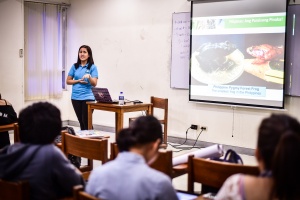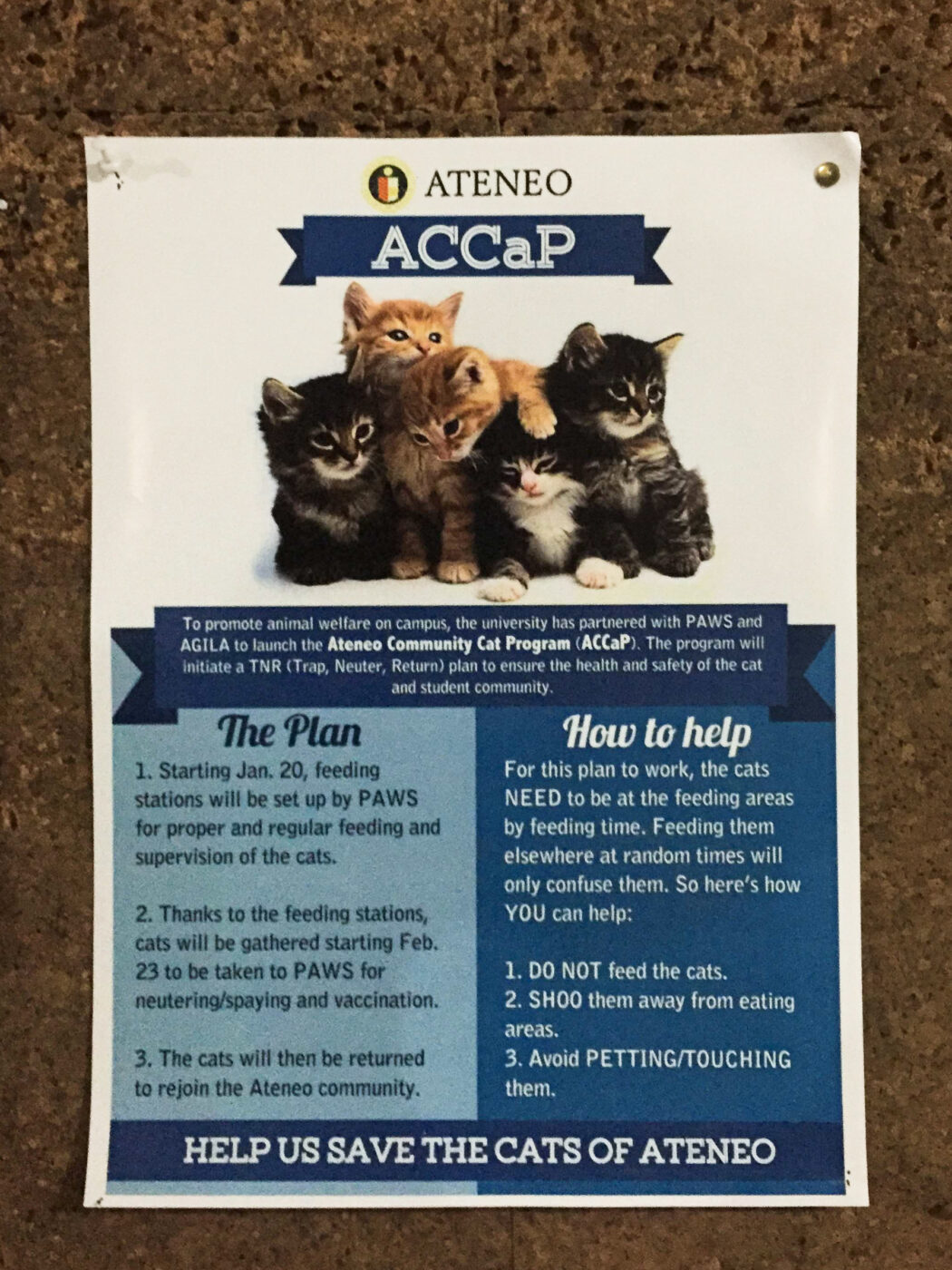VICE PRESIDENT for Administration Nemesio Que, SJ released a memorandum on January 12 to the university community announcing the launch of the .. (Accap), a series of measures intended for the humane management of the Ateneo’s cat population.
In the same memorandum, Que said that the Ateneo will start implementing a Trap, Neuter, Return (TNR) policy on January 20 for the cats in the Ateneo, as advised by the Philippine Animal Welfare Society (PAWS).
PAWS is a volunteer-based, non-profit organization with the goal of preventing animal cruelty.
Under the TNR policy, the 90 cats currently living within the Ateneo campus will be provided with food at designated areas once a day.
Furthermore, the cats will be spayed or neutered in order to inhibit further population growth.
The cats will also be treated with anti-rabies vaccine once in its lifetime to reduce the risk of infection among the Ateneo community.
According to PAWS Executive Director Anna Cabrera, the Ateneo will pay a sum total of P300 and P100 for the care and maintenance of female and male cats, respectively.
Cabrera said the price does not reflect the true cost of the medical treatments, and that PAWS will subsidize the additional costs.
Campus Security and Mobility Office (CSMO) Assistant Director Josephy Almosera manages Accap, with the assistance of PAWS and the Ateneans Guided and Inspired by Love for Animals (Agila).
The CSMO serves to oversee the proper management of campus safety and mobility in coordination with Megaforce Integrated Security Agency (MISA), the security agency outsourced by the university.
The security guards of the Ateneo, under the leadership of MISA Detachment Commander to the Ateneo Darwin Enguerra, are tasked with the monitoring of the cats.
Agila is a non-accredited student organization in the Ateneo that advocates for animal welfare and for respect for all forms of life.
Risk prevention
According to Almosera, the main objective of Accap is “to ensure the safety of the students as well as [to] protect the welfare of the cats.”
“We coordinated with PAWS and Agila in [creating] a sustainable program [that would] balance the safety [of the students] and the preservation of nature,” he added.
According to Agila President Alex Bichara, “There was a confluence of events and circumstances which rendered it necessary for the Ateneo to address problems involving campus resident cats.”
On June 17, 2013, the LS Office of Health Services (LSHS), the Office of the Associate Dean for Student Affairs (ADSA) and the Office of Administrative Services (OAS) released a joint memorandum detailing the increasingly violent incidents between students and cats.
In the memorandum, the offices involved eight documented cases of injury due to cat bites and scratches in the school year 2012 to 2013.
The LSHS, ADSA and OAS expressed concerns over the risk of rabies infection from student encounters with the cats.
In light of these incidents, Agila submitted a “Cat Plan” to the Ateneo administration on July 2014 that aimed to alleviate the cat situation in the campus.
The plan called for a rehabilitation program for resident cats in the Loyola Schools area and provided suggestions on the improvement of food garbage disposal in the campus to limit the spread of cats around the area.
Almosera said that the Ateneo’s ad hoc Committee on Animal Welfare held a joint meeting with representatives of PAWS and Agila on November 2014 to discuss the formulation of a comprehensive cat program.

LOVE FOR ANIMALS. Agila has been sponsoring several talks advocating animal rights since its official inception this school year. (Photo by Andrea G. Beldua)
Policy shift
Bichara said that the implementation of the Accap is a break with the former policy of the Ateneo administration regarding the treatment of its cats.
“We [could not] just trap the cats and put them somewhere else, because we [would have been] violating the Animal Welfare Act,” said Almosera.
Republic Act (RA) No. 10631, an act amending RA No. 8485 or the Animal Welfare Act of 1998, restricts the actions that can be done to animals not classified as pests. The law does not consider cats as pests.
According to Bichara, who did research on the cats of Ateneo, the Ateneo administration recently sought to enlist the services of pest control in order to cull the cat population.
Cabrera said that prior to the inception of Accap, the Ateneo mulled over employing the services of the Quezon City pound, which called for the collection of cats to be euthanized by government-sanctioned veterinarians.
“When we presented [our case to implement TNR] to the Ateneo, we said that the [method of the city pound] was legal, but the problem was that they were going to have to do it again and again,” Cabrera said.
Cabrera explained that the euthanized cats would eventually be replaced by a new set of feral cats, due to the capacity of the campus to sustain them.
She said that the TNR policy serves as a more sustainable and efficient method because it does not disrupt the ecosystem, and allows the cats to live out their lives without euthanasia.
“[Because they agreed to implement the TNR policy] with us, [they will not have to] think about cat population control for around 12 years (the average lifespan of a cat), compared to when you call the pound [to capture the animals] today, next week the problem will arise again,” Cabrera said.
Bichara also stressed the importance of student involvement. “To promote the welfare of resident cats, I would suggest that students have faith in the Accap… [and] comply with its provisions and support it.”
Almosera expressed hope that with the full support of the community, the objective of the program to assure a safe campus for cats and humans will be fulfilled within one to three years.
Editor’s Note: Alex A. Bichara is a member of The GUIDON’s Inquiry Staff.







